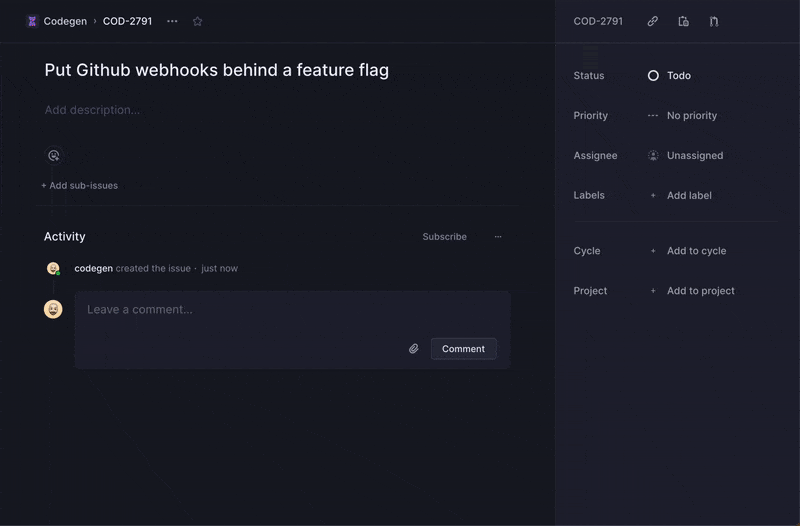Jay Hack, an AI researcher with a background in natural language processing and computer vision, came to the realization several years ago that large language models (LLMs) — think OpenAI’s GPT-4 or ChatGPT — have the potential to make developers more productive by translating natural language requests into code.
After working at Palantir as a machine learning engineer and building and selling Mira, an AI-powered shopping startup for cosmetics, Hack began experimenting with LLMs to execute pull requests — the process of merging new code changes with main project repositories. With the help of a small team, Hack slowly expanded these experiments into a platform, Codegen, that attempts to automate as many mundane, repetitive software engineering tasks as possible leveraging LLMs.
“Codegen automates the menial labor out of software engineering by empowering AI agents to ship code,” Hack told TechCrunch in an email interview. “The platform enables companies to move significantly quicker and eliminates costs from tech debt and maintenance, allowing companies to focus on product innovation.”
So, one might wonder, what sets Codegen apart from code-generating AI like GitHub Copilot, Amazon CodeWhisperer and the Salesforce model with which Codegen shares a name? For one, the challenges that Codegen’s tackling, Hack says. Whereas Copilot, CodeWhisperer and others focus on code autocompletion, Codegen sees to “codebase-wide” issues like large migrations and refactoring (i.e. restructuring an app’s code without altering its functionality).
“Codegen leverages a multi-agent system for complex code generation,” Hack explained. “This entails orchestrating a swarm of agents that collaboratively decompose and solve large tasks. Many LLMs effectively deliberate and build upon each other’s work, [which] yields significantly better outputs.”

Image Credits: Codegen
Codegen’s core product is a cloud and on-premises tool that connects to codebases and project management boards, such as Jira and Linear, and automatically generates pull requests to address support tickets. The platform can even set up some of the necessary code infrastructure and logging, Hack says — although it wasn’t clear to this reporter what Hack meant by “infrastructure.”
“In contrast to other solutions, Codegen provides a higher level of automation in executing entire tasks on behalf of developers,” Hack said. “We scrape a company’s backlog, find the solvable tickets, then spin up an army of agents to find the relevant code and produce a pull request.”
Now, Codegen’s promising a lot considering even the best AI models today make major mistakes. For example, it’s well-established that generative coding tools can introduce insecure code, with one Stanford study suggesting that software engineers who use code-generating AI are more likely to cause security vulnerabilities in the apps they develop.
Hack says that Codegen, for its part, is trying to strike “the right balance” of human oversight and best practices surrounding monitoring LLM-generated code.
“This is important work, and the entire development ecosystem would benefit from a better understanding of how to evaluate and verify LLM output,” Hack said. “Significant advances will need to occur for there to be widespread developer trust in generalized, automated code generation systems.”
Investors seem to think that Codegen’s going places, for what it’s worth.
The company this week announced that it closed a $16 million seed round led by Thrive Capital with participation from angel investors including Quora CEO Adam D’Angelo and Instagram co-founder Mike Krieger. The tranche brings Codegen’s total raised to $16.2 million and values the startup at $60 million post-money, Hack claims.
Thrive’s Philip Clark had this to say via email: “In 2023, most developers still spend an unreasonable share of their time writing code to deal with low-level tasks like migrations, refactors, integrations and bug fixes. Companies like Codegen are leveraging LLMs to build AI agents that free engineers from this drudgery. Developers will soon be able to hand off jobs to agents so that they can stop worrying about software toil and stay focused on creating new products.”
San Francisco-based Codegen doesn’t have paying customers yet — it’s currently incubating the platform with two “large-scale” enterprise partners. But Hack’s anticipating growth into the next year.
“We’re raising significant capital as the opportunity to make such a substantial and ambitious product has only recently emerged, and we want to sprint full force towards the market,” he said, adding that Codegen plans to grow its workforce from six employees to 10 by the end of the year. “The funds will be used to scale our workforce and support our infrastructure.”
